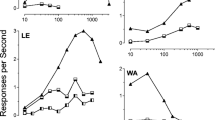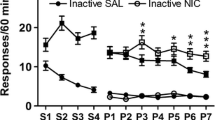Abstract
Rhesus monkeys received intravenous injections of ethanol during daily sessions contingent on their presses on an available lever. Under the standard conditions, when each response on the lever during a 3-h period each day resulted in an i.v. injection of 0.1 g/kg ethanol, the monkeys made between 30 and 50 responses/session and developed blood ethanol levels of approximately 400 mg%. Under this and other conditions of response-contingent delivery of ethanol, a negatively accelerated pattern of self-injection within sessions was demonstrated. Variations in the dose per injection (0.05–0.2 g/kg/injection) resulted in changes in the rate of lever-pressing; the number of self-injections was inversely related to dose. Ethanol intake increased only slightly with increased dose per injection. Noncontingent administration of various doses of i.v. ethanol immediately prior to a daily session decreased the number of responses; the total amount of ethanol administered (contingent plus noncontingent), however, remained constant over a pretreatment dose range of 1 to 3 g/kg. When access time to ethanol was increased from 3 to 6 h/day, the total amount of ethanol taken increased slightly. However, the blood ethanol levels at the end of a 6-h session closely approximated those obtained following 3-h sessions, indicating that during the last 3–4 h of the 6-h sessions, the rate of ethanol intake closely matched the rate of ethanol elimination.
Similar content being viewed by others
References
Barry, H., III, Krimmer, E. C.: Discriminable stimuli produced by alcohol and other CNS depressants. In: Discriminable stimulus properties of drugs, H. Lal, ed., pp. 73–92. New York: Plenum Press 1977
Bonnichsen, R.: Ethanol determination with alcohol dehydrogenase and DPN. In: Methods of enzymatic analysis, H. U. Bergmeyer, ed., pp. 285–287. New York: Academic Press 1963
Deneau, G. A., Yanagita, T., Seevers, M. H.: Self-administration of psychoactive substances by the monkey: a measure of psychological dependence. Psychopharmacologia (Berl.) 16, 30–48 (1969)
Goldberg, S. R., Woods, J. H., Schuster, C. R.: Morphine: conditioned increases in self-administration in rhesus monkeys. Science 166, 1306 (1969)
Overton, D. A.: State dependent learning produced by alcohol and its relevance to alcoholism. In: The biology of alcoholism, vol. 2, physiology and behavior, B. Kissin and H. Begleiter, eds., pp. 193–217. New York: Plenum Press 1972
Winger, G. D., Woods, J. H.: The reinforcing property of ethanol in the rhesus monkey. I. Initiation, maintenance and termination of intravenous ethanol-reinforced responding. Ann. N.Y. Acad. Sci. 215, 162–175 (1973)
Woods, J. H., Ikomi, F., Winger, G.: The reinforcing property of ethanol. In: The biological aspects of alcohol, M. K. Roach, W. M. McIsaac, and P. J. Creaven, eds., pp. 371–388. Austin: University of Texas Press 1971
Yokel, R. A., Pickens, R.: Drug levels of d- and l-amphetamine during intravenous self-administration. Psychopharmacologia (Berl.) 34, 255–264 (1974)
Author information
Authors and Affiliations
Rights and permissions
About this article
Cite this article
Karoly, A.J., Winger, G., Ikomi, F. et al. The reinforcing property of ethanol in the rhesus monkey. Psychopharmacology 58, 19–25 (1978). https://doi.org/10.1007/BF00426785
Received:
Accepted:
Issue Date:
DOI: https://doi.org/10.1007/BF00426785




